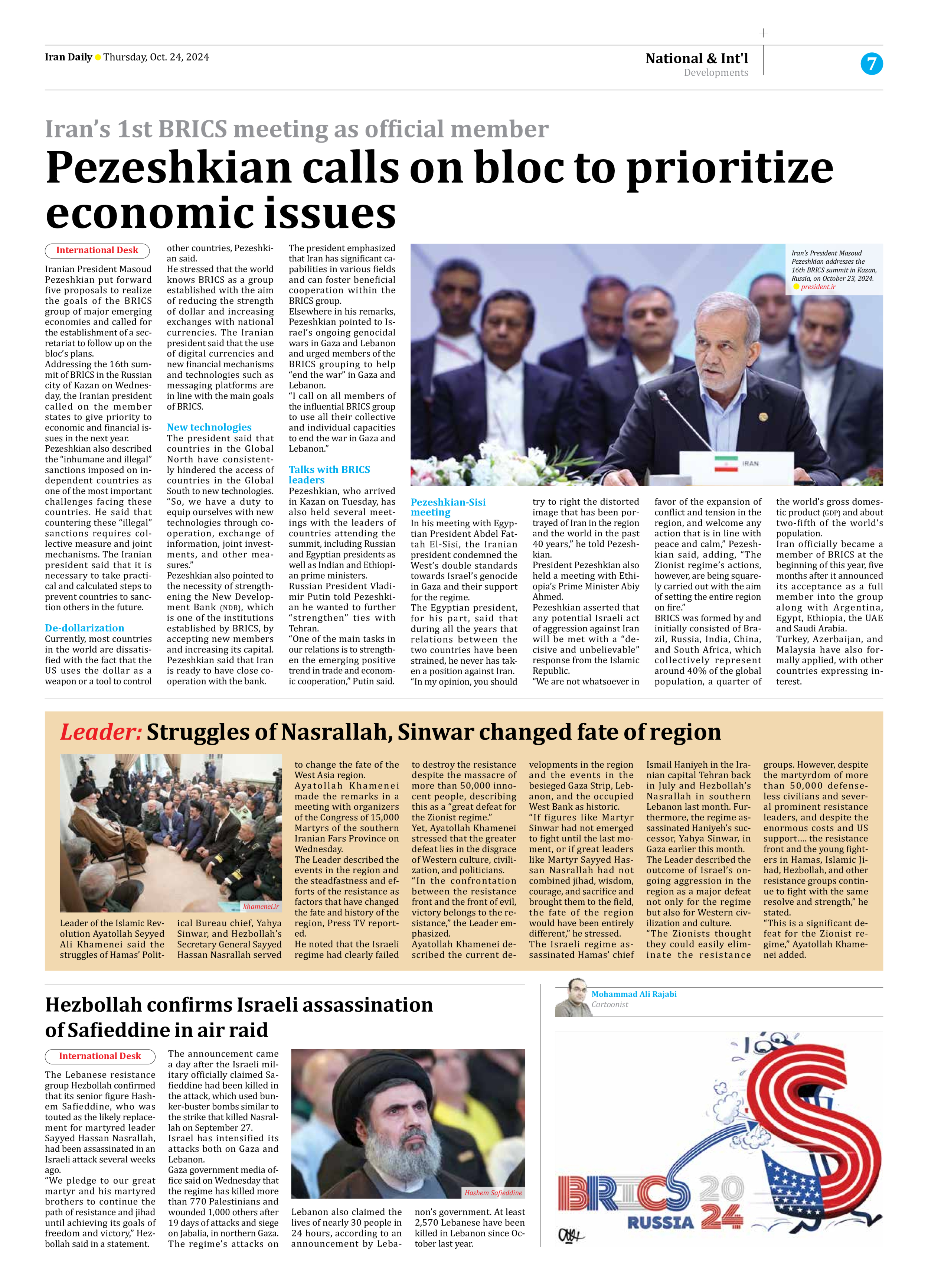
Iran’s 1st BRICS meeting as official member
Pezeshkian calls on bloc to prioritize economic issues
Iranian President Masoud Pezeshkian put forward five proposals to realize the goals of the BRICS group of major emerging economies and called for the establishment of a secretariat to follow up on the bloc’s plans.
Addressing the 16th summit of BRICS in the Russian city of Kazan on Wednesday, the Iranian president called on the member states to give priority to economic and financial issues in the next year.
Pezeshkian also described the “inhumane and illegal” sanctions imposed on independent countries as one of the most important challenges facing these countries. He said that countering these “illegal” sanctions requires collective measure and joint mechanisms. The Iranian president said that it is necessary to take practical and calculated steps to prevent countries to sanction others in the future.
De-dollarization
Currently, most countries in the world are dissatisfied with the fact that the US uses the dollar as a weapon or a tool to control other countries, Pezeshkian said.
He stressed that the world knows BRICS as a group established with the aim of reducing the strength of dollar and increasing exchanges with national currencies. The Iranian president said that the use of digital currencies and new financial mechanisms and technologies such as messaging platforms are in line with the main goals of BRICS.
New technologies
The president said that countries in the Global North have consistently hindered the access of countries in the Global South to new technologies.
“So, we have a duty to equip ourselves with new technologies through cooperation, exchange of information, joint investments, and other measures.”
Pezeshkian also pointed to the necessity of strengthening the New Development Bank (NDB), which is one of the institutions established by BRICS, by accepting new members and increasing its capital. Pezeshkian said that Iran is ready to have close cooperation with the bank.
The president emphasized that Iran has significant capabilities in various fields and can foster beneficial cooperation within the BRICS group.
Elsewhere in his remarks, Pezeshkian pointed to Israel’s ongoing genocidal wars in Gaza and Lebanon and urged members of the BRICS grouping to help “end the war” in Gaza and Lebanon.
“I call on all members of the influential BRICS group to use all their collective and individual capacities to end the war in Gaza and Lebanon.”
Talks with BRICS leaders
Pezeshkian, who arrived in Kazan on Tuesday, has also held several meetings with the leaders of countries attending the summit, including Russian and Egyptian presidents as well as Indian and Ethiopian prime ministers.
Russian President Vladimir Putin told Pezeshkian he wanted to further “strengthen” ties with Tehran.
“One of the main tasks in our relations is to strengthen the emerging positive trend in trade and economic cooperation,” Putin said.
Pezeshkian-Sisi meeting
In his meeting with Egyptian President Abdel Fattah El-Sisi, the Iranian president condemned the West’s double standards towards Israel’s genocide in Gaza and their support for the regime.
The Egyptian president, for his part, said that during all the years that relations between the two countries have been strained, he never has taken a position against Iran.
“In my opinion, you should try to right the distorted image that has been portrayed of Iran in the region and the world in the past 40 years,” he told Pezeshkian.
President Pezeshkian also held a meeting with Ethiopia’s Prime Minister Abiy Ahmed.
Pezeshkian asserted that any potential Israeli act of aggression against Iran will be met with a “decisive and unbelievable” response from the Islamic Republic.
“We are not whatsoever in favor of the expansion of conflict and tension in the region, and welcome any action that is in line with peace and calm,” Pezeshkian said, adding, “The Zionist regime’s actions, however, are being squarely carried out with the aim of setting the entire region on fire.”
BRICS was formed by and initially consisted of Brazil, Russia, India, China, and South Africa, which collectively represent around 40% of the global population, a quarter of the world’s gross domestic product (GDP) and about two-fifth of the world’s population.
Iran officially became a member of BRICS at the beginning of this year, five months after it announced its acceptance as a full member into the group along with Argentina, Egypt, Ethiopia, the UAE and Saudi Arabia.
Turkey, Azerbaijan, and Malaysia have also formally applied, with other countries expressing interest.







